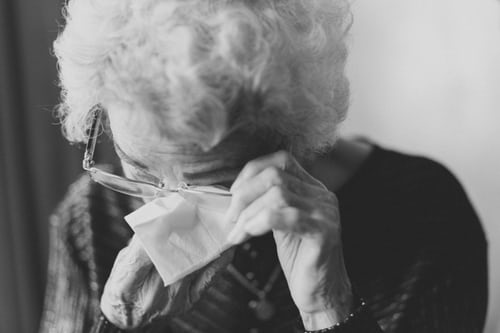Before I get started today, I want to apologize for missing the last two Meditation Monday installments. The engineer and I enjoyed a lovely respite in the mountains of Southern California, where we hiked some trails—including a tiny part of the Pacific Crest Trail—and generally reveled in the crisp fall weather and falling leaves.
Then, promptly upon my arrival home, I succumbed to either a food-borne illness or stomach virus. Whatever it was, it was nasty! And I am SO glad to be back in the land of the living!
But let’s get into our topic of grief, which we’ll be covering through the end of the year.
What kind of grief?
I was reminded of the different faces of grief when talking to a dear friend moving away from Tucson to live near her daughter in another state. She’s been a widow for five years, but she’ll be suffering a different kind of grief this Thanksgiving and Christmas. One having to do with a son that suffers from a mental illness and won’t be celebrating the holidays with his family this year.
Another friend of mine deals with the same issue—a child with a mental illness. While all things are looking good right now, you never know when the other shoe will drop. Hard.
Just how do you console a friend who’s dealing with this kind of raw grief? A grief of fear about the future, fear of dying dreams, fear of having lost control, or realizing one never really possesses that?
The stages of grief for someone suffering this way aren’t too different from the stages of grief someone goes through when losing a loved one. But they can be more intense than the emotions a loved one goes through when losing, say, a parent who has been sick for some time, or in very poor health. Like an Alzheimer’s patient who has been suffering for years and their family that has had to take the “long goodbye” journey with them.
How you can help a grieving person, especially during the holidays?
While you can’t remove the deep pain of grief people often experience during the holidays, there are steps you can take to help them navigate the holiday landmines.
Be present.
Don’t just let them know you’re available or a phone call away, call them and schedule a lunch date, an outing, a time to get together. Or just a phone call to let them chat and share their p ain. Your presence alone will let them know just how much they’re loved, and remembered.
Allow them to grieve.
Bury your uncomfortable feelings about being around grieving people. Be brave and don’t fear wading into the pain with them. Don’t let their neediness drive you away. Be prepared to go the distance with the, to walk with them through their agony.
Listen!
Let them rant. Let them reminisce. Let them agonize over their loss, fear and loneliness. Mirror back to them what they’re saying without trying to give them advice or fix it. Be patient when what they say doesn’t make sense or they can’t concentrate or make decisions.
Get involved in the memories.
If a friend or loved one is joining you for the holidays, ask the grieving person how you might help them reminisce or mark the loss?
Stay flexible.
Don’t pressure a grieving person to get involved, or tell them what they need. Encourage them to join you for the festivities or meals, but don’t push. Respect their need to grieve privately, and let them know they are always welcome, even if they don’t—or can’t—make a decision until the last minute.
If the person doesn’t join you, make sure you call that day, or the next, to check in with them.
Help.
Most grieving people won’t ask for help. Often, they feel overwhelmed and don’t know what they need.
Offer to help around the house—cleaning, laundry, errand running. Maybe a grieving friend might enjoy company while grocery shopping. Maybe they don’t even have enough energy to go shopping and would love to have some meals—or groceries delivered.
Years ago, an overwhelmed friend of ours had to move herself and her three young daughters into a tiny two-bedroom apartment after having to leave her abusive, alcoholic husband. We knew she was barely making ends meet.
I also knew that if I called her to ask open-ended questions about any help she might need, she would be too uncomfortable asking for anything. So, I got in the habit of calling her prior to one of my grocery shopping runs to ask her for a list of items she needed. I didn’t ask if she needed anything; I asked her what she needed.
She gave me a list, and I shopped for two and dropped off her items on the way home. She was beyond grateful. And I was only too happy to pay back in some way for the loving gestures of people who kept my family well-fed while I was bedridden during my last pregnancy.
Adopt a family for the holidays.
The engineer and I also adopted a family of a single mother and several children who wanted so much to visit her parents in another city for Christmas. We provided a basket full of snack food for their drive, and a bunch of cash stuffed inside the food basket for gas money and some treats. We left them with their basket before they opened it. A tearful phone call from the mom the next day, after they’d opened the gift, told us everything we needed to know about our gift. It was better than anything I received myself that Christmas.
Next week, I’ll offer more ideas for helping others manage grief during the holidays.
Until then, think of those in your circle that might be suffering grief over the holidays—loss of a loved one, grieving a family member’s addiction or mental illness, recent cancer or serious health diagnosis. Figure out how you can reach out to them, and then take the step.
Blessings,
and a very Happy Thanksgiving!
Andrea
Andrea Arthur Owan is an award-winning inspirational writer, fitness pro and chaplain. She writes and works to help people live their best lives—physically, emotionally, and spiritually.

